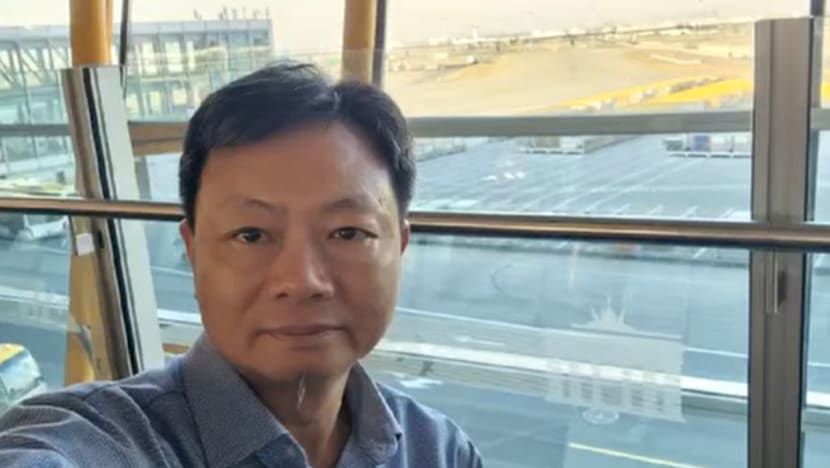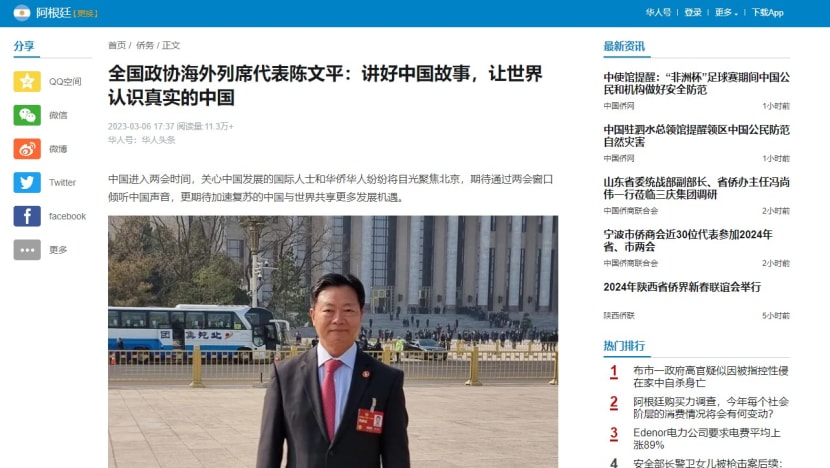Analysis: Why Philip Chan was deemed to have 'crossed a red line' under Singapore's foreign interference law

Singaporean businessman Philip Chan Man Ping has been designated a politically significant person. (File photo: Instagram)

This audio is generated by an AI tool.
SINGAPORE: A Singaporean businessman likely advocated Chinese interests through his involvement in China's top political advisory body as well as grassroots work in Singapore, which crossed a line in the authorities' eyes, experts told CNA.
While Mr Philip Chan Man Ping is not the only Singapore resident publicly known to be associated with the Chinese People's Political Consultative Conference (CPPCC) or its affiliates, the difference lies in his public comments and grassroots links, the experts added.
On Monday (Feb 26), Mr Chan became the first individual to be designated as a "politically significant person" under the country’s nascent foreign interference law – the Foreign Interference (Countermeasures) Act, or FICA.
"There is no saying that a Singaporean cannot join a foreign organisation," said Assistant Professor Benjamin Ho from the S Rajaratnam School of International Studies (RSIS).
"But I think ... this is where you need to draw the line: Whose interests do you represent when you join this organisation? Obviously, if it is a business interest, sure, go ahead.
"If you try to import some of these organisational objectives into the political realm over here, then I think that's where the problem starts."
Mr Chan, the managing director of three property firms, immigrated from Hong Kong in 1990. He subsequently became a naturalised citizen.
The 59-year-old was assessed to have shown susceptibility to being influenced by foreign actors, and a willingness to advance their interests, the Ministry of Home Affairs (MHA) previously said without naming any foreign entity.
MHA also did not specify the political end that Mr Chan’s activities were directed towards. He has one month to appeal to Home Affairs Minister K Shanmugam against the decision of the Registrar of Foreign and Political Disclosures.
Individuals can be designated as a politically significant person if their activities are directed towards a political end, and it is in the public interest for the authorities to apply countermeasures under FICA. These legal provisions came into force in December 2023.
With the designation, Mr Chan is now required to disclose annually political donations of S$10,000 (US$7,400) or more that he receives and accepts, foreign affiliations and migration benefits to the registrar.
Singaporean businessman Chan Man Ping Philip has been served a notice that the authorities will designate him as a "politically significant person" under a law to counter foreign interference. Mr Chan is believed to be the first person to have received such a notice since the law came into force in December 2023. Lauren Ong with more.
Mr Chan’s actions likely became problematic when he publicly promoted China’s interests and pushed for a “more favourable image of China within Singapore”, said Asst Prof Ho, who coordinates the China Programme at RSIS.
He noted that Mr Chan appeared to have done this of his own volition, but such activities should generally be left to a country’s foreign ministry and diplomats.
It is one thing for diplomats to "go out there and try to sell stories", but it is another thing to try to get a citizen of another country to sell the narrative for you, added Asst Prof Ho.
Mr Chan heads the Hong Kong Chamber of Commerce in Singapore and was the president of the Kowloon Club from 2011 until stepping down from the role earlier this month. The association in Singapore supports immigrants mainly from Hong Kong.
As president of the club, he wrote 25 pieces – mostly letters – for Singapore's Chinese-language daily Lianhe Zaobao between 2016 and 2019. Some letters touched on global politics and China’s place in the world, such as one in 2018 titled “Wronged” which said that China has "suffered a lot of grievances”.
In an interview with Chinese media outlet Huaren Toutiao, he said his influence remained “limited" despite publishing articles in Lianhe Zaobao.
“Since we can only do little alone, we therefore need to be more united,” he wrote, adding that Western media had “smeared” China and discredited its Belt and Road initiative.
Mr Chan was also president of the Hong Kong Singapore Business Association. It serves as a platform to link business communities in Singapore and Hong Kong, as well as promote industry and commerce between both cities and China.

Asst Prof Ho further pointed to Mr Chan’s involvement in grassroots and fundraising efforts in Singapore, some of which brought him into contact with local politicians.
Mr Chan was a patron of the Kampong Chai Chee Citizens' Consultative Committee and the Bukit Timah Community Club Management Committee. He has stepped down from all grassroots appointments.
“I don’t think these connections are irrelevant, and to the extent that he might have sort of influenced people within his own circle of domestic networks about China, I guess that's where you've got the government a bit concerned,” said Asst Prof Ho.
Separately, Mr Chan was issued a stern warning by the Singapore police in 2019 for facilitating an illegal public gathering to discuss the Hong Kong protests. He owned a bar at The Sail @ Marina Bay where the gathering was held.
DEALINGS WITH CPPCC
The experts also raised Mr Chan’s involvement in CPPCC.
The CPPCC is a political advisory and proposing body that, in theory, scrutinises policies and proposes new ones, said Assistant Professor Dylan Loh from Nanyang Technological University's (NTU) public policy and global affairs division.
While it does not have decision-making or legislative powers, it is a key part of the Chinese Communist Party's (CCP) United Front work.
Historically, United Front work has included infiltrating other organisations and creating divisions, said Associate Professor Chong Ja Ian from the National University of Singapore (NUS). It was also used as a platform to incorporate non-CCP entities in China into the political system as well as weaken resistance to CCP rule, he added.
Asst Prof Loh noted that CPPCC’s membership is deliberately diverse to incorporate non-CCP members and the different “people’s organisations”, which are interest groups of sorts.
In March 2023, Mr Chan was one of 30 representatives globally to be invited by CPPCC to attend China’s Two Sessions parliamentary meetings – the nation’s most important political event of the year.
In his Huaren Toutiao interview, he said he hoped that overseas representatives of CPPCC could form an alliance and organise an event – possibly yearly – to facilitate exchanges and sharing, to help overseas Chinese “contribute towards telling China’s story well”.
Related:
When asked if it is problematic for other Singaporeans to be involved with CPPCC, Asst Prof Loh said that any involvement with foreign political bodies “is inherently sensitive” and must not come at the expense of Singapore’s interests.
"I think what was helpful in the case of Philip Chan was that there was evidence presented publicly in the media that showed very clearly ... even to a layperson, that the activities crossed a red line,” added Asst Prof Loh.
“The bar for this red line should be high and in this case, in my view, the bar has been well met.”
Asst Prof Ho said that Mr Chan’s designation sends a signal to others that “ultimately, Singapore's interests are meant for Singaporeans to adjudicate”.
"Whether that signal is strong enough to stop other people who are involved, I think we can only wait and tell.”
POLITICAL ENDS
As for how the Singapore authorities define someone’s activities as being directed towards a political end, the experts noted that this has – likely intentionally – been vague so far.
Both Asst Profs Ho and Loh said it should not be defined too clearly as it could prompt people to find ways to circumvent the FICA provisions.
Asst Prof Loh said the vagueness “reflects the very real difficulties” in determining whether something is nefarious, or clearly directed towards political ends.
"If you have too neat a definition and say, only activities X and Y fall under this definition, then you are precluding all other activities that could also be used for political ends,” he said.
“This would not be helpful because influence activities are dynamic and constantly evolve: Bad actors will always look for loopholes.”
NTU’s Asst Prof Ho echoed this, adding: “You’ve got to trust that whatever concerns MHA have, is not without reason.”
On the other hand, Assoc Prof Chong from NUS said he hopes the relevant authorities can clarify what they mean by a “political end”.
“So long as people and entities exist in society, they are involved in politics and have political ends … Is this lobbying? If so, then many people and entities are involved, including citizens seeking their MPs' help to make some change.”
















